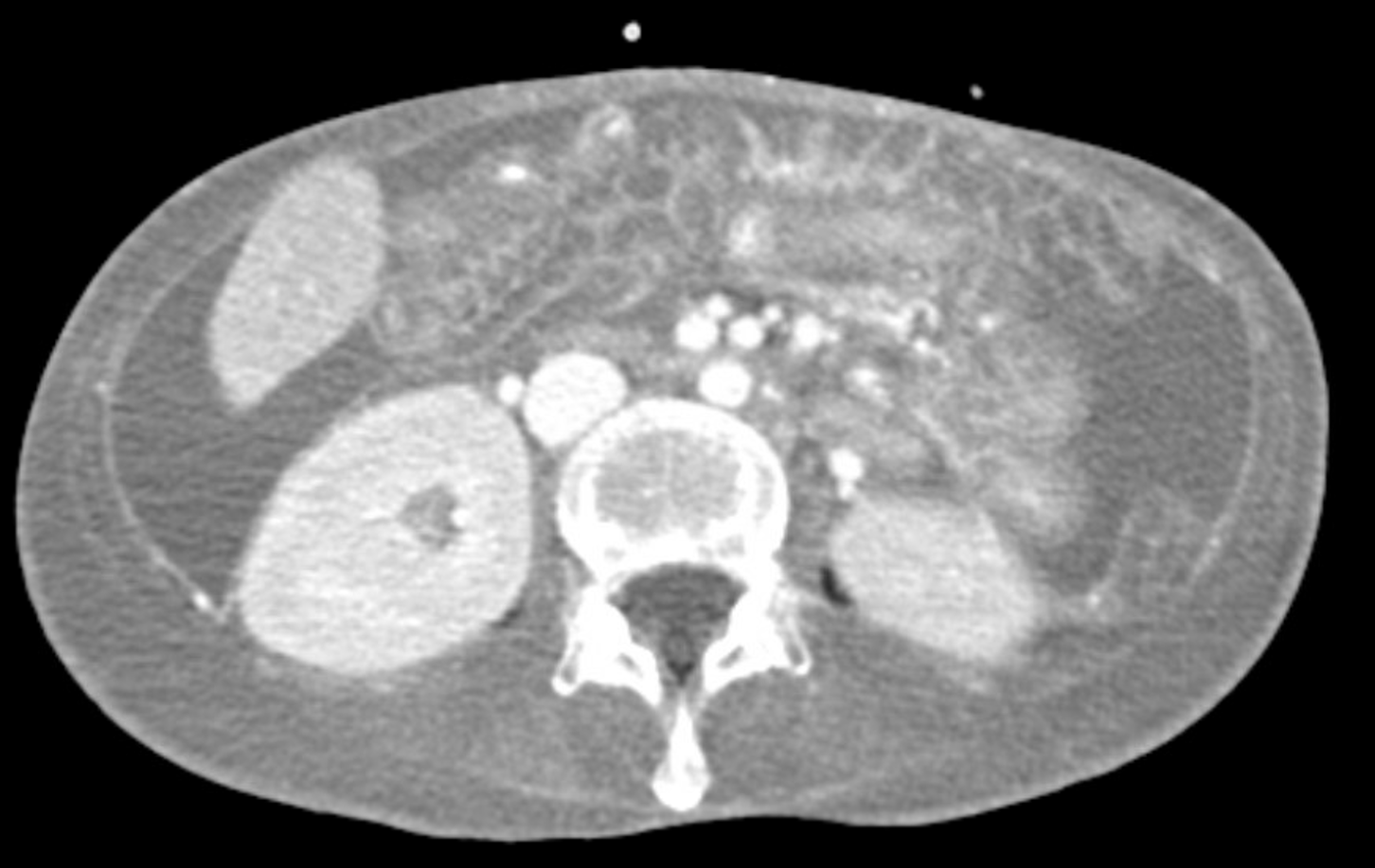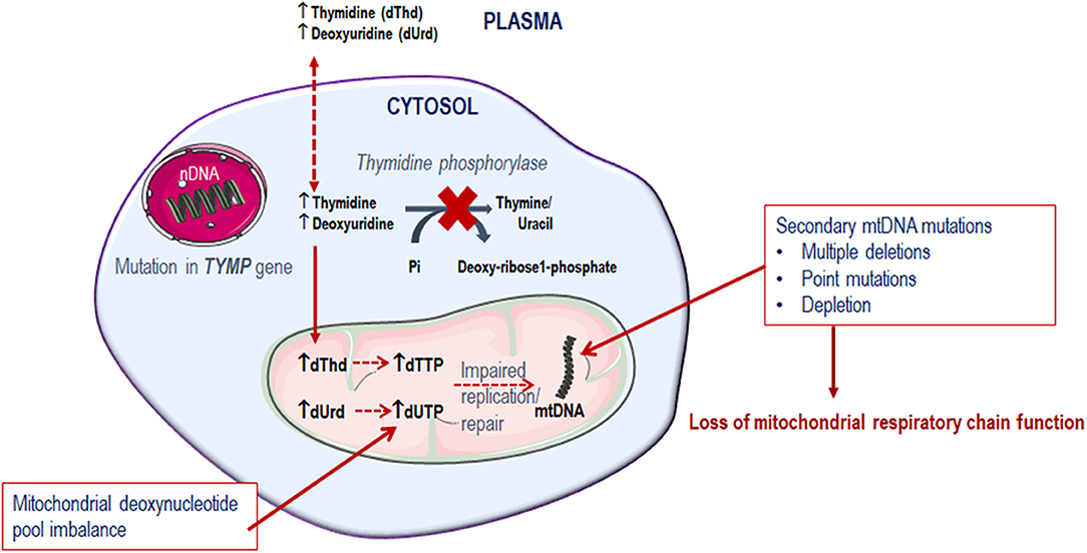Monday Poster Session
Category: Stomach and Spleen
P4227 - Tummyaches and Tribulations: Unraveling the Genetic Threads of a Stomach's Silent Struggles
Monday, October 27, 2025
10:30 AM - 4:00 PM PDT
Location: Exhibit Hall

Niloy Ghosh, MD
University of New Mexico Health Sciences Center
Albuquerque, NM
Presenting Author(s)
Award: ACG Presidential Poster Award
Niloy Ghosh, MD, Abu Baker Sheikh, MD
University of New Mexico Health Sciences Center, Albuquerque, NM
Introduction: Mitochondrial neurogastrointestinal encephalopathy (MNGIE) is a rare metabolic disorder affecting the gastrointestinal and nervous systems, marked by chronic dysmotility, cachexia, peripheral neuropathy, and leukoencephalopathy. We report a case in a 27-year-old admitted for acute on chronic abdominal pain.
Case Description/
Methods: A 27-year-old female with multiple hospital admissions for presumed anorexia nervosa presented in March 2024 with acute abdominal pain and hematochezia. Medical history included progressive sensorineural hearing loss over the past 5 years and consanguineous parents. Labs on presentation with lactate of 5.8 and tachycardia to 140s. Exploratory laparotomy showed normal-appearing bowel without ischemia. CTA abdomen/pelvis showed left abdominal wall pneumoperitoneum but no new bowel wall thickening. Postoperatively, the patient had a complex medical course, including large volume ascites complicated by recurrent bacterial peritonitis treated with multiple rounds of antibiotics. She continued to have difficulty tolerating oral feeds and was transitioned to TPN. Subsequently, the patient developed progressive weakness and decline in mental status and both neurology and genetics were consulted. Exome sequencing showed a homozygous c.516+2T >A pathogenic TYMP variant, confirming MNGIE. Patient was discharged from hospital to long-term care facility, but then re-presented to hospital with septic shock presumed secondary to aspiration pneumonia versus abdominal compartment syndrome. Clinical status declined considerably in following days, and the patient was deceased in May 2024.
Discussion: Early diagnosis of MNGIE is challenging due to the nonspecific nature of symptoms and the rarity of the disease. The pathophysiology of MNGIE involves the systemic accumulation of thymidine and deoxyuridine due to a deficiency of thymidine phosphorylase (TYMP), leading to mitochondrial dysfunction and impaired energy metabolism. Management remains challenging, and no curative treatments are available. Current therapeutic approaches are primarily supportive, focusing on nutritional support and symptomatic management. Our case represents the first known instance of a c.516+2T >A variant in the TYMP gene in the literature. Ongoing research into targeted therapies is paramount to address the underlying metabolic defect and improve the quality of life for affected patients.

Figure: CT Scan showing left abdominal wall pneumoperitoneum, but no new bowel wall thickening

Figure: Biochemistry of MNGIE
Disclosures:
Niloy Ghosh indicated no relevant financial relationships.
Abu Baker Sheikh indicated no relevant financial relationships.
Niloy Ghosh, MD, Abu Baker Sheikh, MD. P4227 - Tummyaches and Tribulations: Unraveling the Genetic Threads of a Stomach's Silent Struggles, ACG 2025 Annual Scientific Meeting Abstracts. Phoenix, AZ: American College of Gastroenterology.
Niloy Ghosh, MD, Abu Baker Sheikh, MD
University of New Mexico Health Sciences Center, Albuquerque, NM
Introduction: Mitochondrial neurogastrointestinal encephalopathy (MNGIE) is a rare metabolic disorder affecting the gastrointestinal and nervous systems, marked by chronic dysmotility, cachexia, peripheral neuropathy, and leukoencephalopathy. We report a case in a 27-year-old admitted for acute on chronic abdominal pain.
Case Description/
Methods: A 27-year-old female with multiple hospital admissions for presumed anorexia nervosa presented in March 2024 with acute abdominal pain and hematochezia. Medical history included progressive sensorineural hearing loss over the past 5 years and consanguineous parents. Labs on presentation with lactate of 5.8 and tachycardia to 140s. Exploratory laparotomy showed normal-appearing bowel without ischemia. CTA abdomen/pelvis showed left abdominal wall pneumoperitoneum but no new bowel wall thickening. Postoperatively, the patient had a complex medical course, including large volume ascites complicated by recurrent bacterial peritonitis treated with multiple rounds of antibiotics. She continued to have difficulty tolerating oral feeds and was transitioned to TPN. Subsequently, the patient developed progressive weakness and decline in mental status and both neurology and genetics were consulted. Exome sequencing showed a homozygous c.516+2T >A pathogenic TYMP variant, confirming MNGIE. Patient was discharged from hospital to long-term care facility, but then re-presented to hospital with septic shock presumed secondary to aspiration pneumonia versus abdominal compartment syndrome. Clinical status declined considerably in following days, and the patient was deceased in May 2024.
Discussion: Early diagnosis of MNGIE is challenging due to the nonspecific nature of symptoms and the rarity of the disease. The pathophysiology of MNGIE involves the systemic accumulation of thymidine and deoxyuridine due to a deficiency of thymidine phosphorylase (TYMP), leading to mitochondrial dysfunction and impaired energy metabolism. Management remains challenging, and no curative treatments are available. Current therapeutic approaches are primarily supportive, focusing on nutritional support and symptomatic management. Our case represents the first known instance of a c.516+2T >A variant in the TYMP gene in the literature. Ongoing research into targeted therapies is paramount to address the underlying metabolic defect and improve the quality of life for affected patients.

Figure: CT Scan showing left abdominal wall pneumoperitoneum, but no new bowel wall thickening

Figure: Biochemistry of MNGIE
Disclosures:
Niloy Ghosh indicated no relevant financial relationships.
Abu Baker Sheikh indicated no relevant financial relationships.
Niloy Ghosh, MD, Abu Baker Sheikh, MD. P4227 - Tummyaches and Tribulations: Unraveling the Genetic Threads of a Stomach's Silent Struggles, ACG 2025 Annual Scientific Meeting Abstracts. Phoenix, AZ: American College of Gastroenterology.

